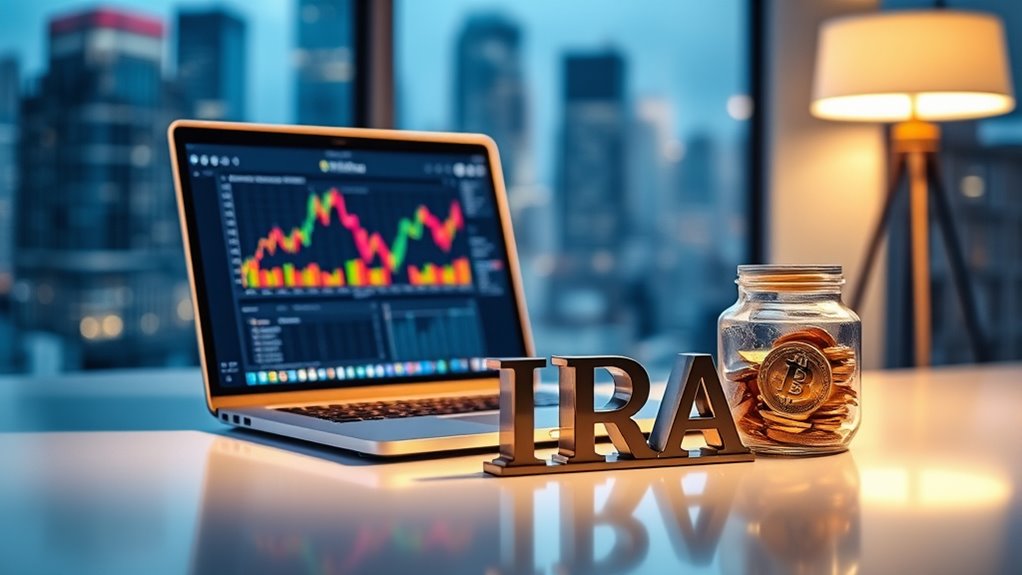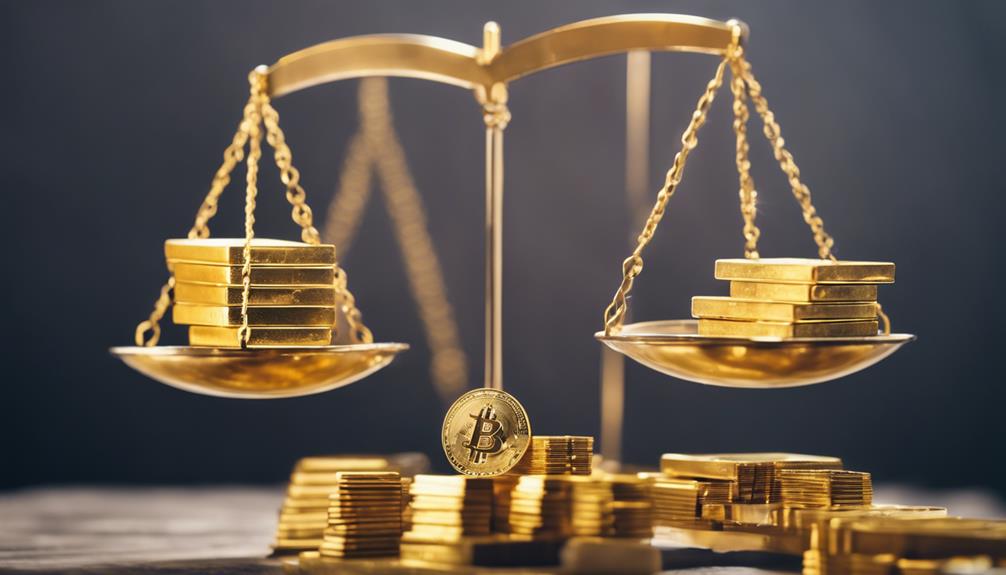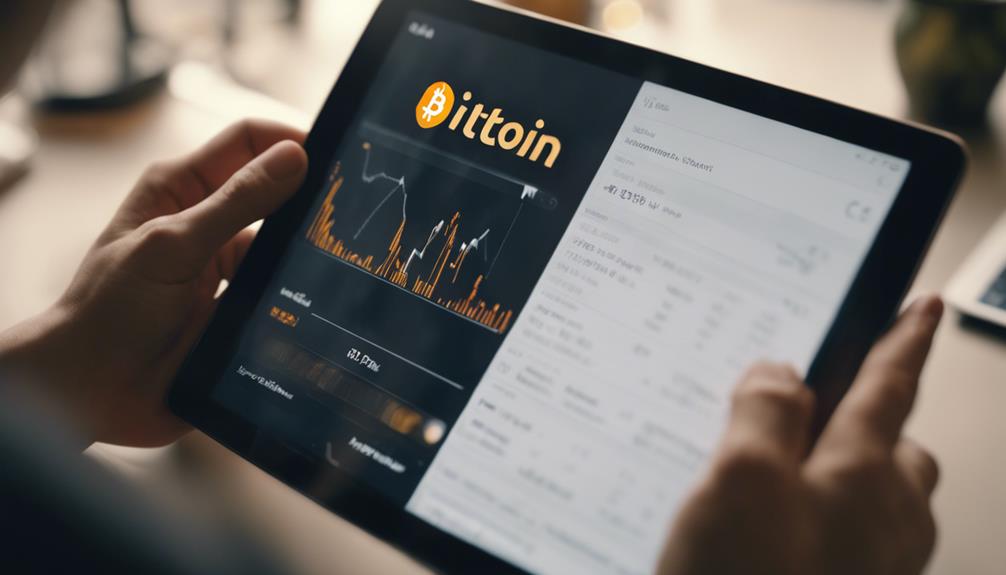Holding cryptocurrencies in your IRA can diversify your retirement portfolio and offer high-growth potential with tax advantages. However, it also exposes you to significant risks like market volatility, regulatory uncertainties, and high fees. While you may benefit from substantial gains, the volatility and lack of insurance make it a risky choice for some investors. If you’re interested in understanding the full picture, you’ll find helpful insights on both the opportunities and challenges involved.
Key Takeaways
- Crypto IRAs offer diversification and tax advantages, enhancing long-term retirement growth potential.
- They carry high volatility risks, which can lead to significant losses during market downturns.
- Regulatory changes and evolving laws may impact the legality and trading conditions of cryptocurrencies within IRAs.
- Fees for setup, custodial services, and trading can be substantial, adding to overall investment costs.
- Suitable mainly for long-term investors with high risk tolerance seeking growth and strategic tax benefits.

Investing in cryptocurrencies through an IRA offers a unique opportunity to diversify your retirement portfolio with high-growth assets. It allows you to include digital currencies like Bitcoin, Ethereum, and others within a regulated retirement account. This setup is designed for long-term investors aiming to expand their portfolio beyond traditional stocks, bonds, and real estate. By holding cryptocurrencies in an IRA, you benefit from the account’s custodian or specialized platform, which guarantees compliance with regulations and offers tax advantages based on the IRA type. For example, a Traditional IRA provides tax-deferred growth, reducing your current taxable income, while a Roth IRA offers tax-free growth and withdrawals, making it attractive if you expect cryptocurrencies to appreciate considerably. Plus, within an IRA, you don’t pay capital gains taxes on crypto appreciation, allowing your investments to grow unhindered by annual taxes, especially advantageous for long-term growth.
Invest in cryptocurrencies via an IRA to diversify your retirement portfolio tax-advantaged and for long-term growth.
Crypto IRAs also diversify your holdings, helping you manage risk more effectively. If you’re concerned about inflation eroding traditional assets, cryptocurrencies can act as a hedge, since their value often moves independently of fiat currencies. Incorporating digital currencies spreads your investments across different asset classes, which can reduce overall portfolio risk. Additionally, cryptocurrencies have high growth potential, offering the chance for substantial returns compared to traditional assets, though this comes with notable risks. Cryptocurrency regulations are evolving globally, which can impact your ability to trade or hold certain assets in your IRA.
However, holding crypto in an IRA isn’t without drawbacks. Cryptocurrencies are highly volatile, with prices capable of swinging dramatically in short periods. This volatility can lead to significant losses, especially during market downturns. Regulatory uncertainty also poses risks, as governments worldwide are still developing frameworks for cryptocurrencies, which could impact their legality or trading conditions in the future. Liquidity can be another concern; early withdrawals from a crypto IRA may incur penalties, and limited trading options on some platforms can restrict your ability to quickly sell assets when needed. Unlike banks or brokerage accounts, cryptocurrencies aren’t insured by the FDIC or SIPC, increasing the risk of loss if your holdings are compromised or the platform fails.
Given these factors, a crypto IRA is generally better suited for long-term investors with a high risk tolerance. It’s especially appealing if you expect substantial growth from your crypto holdings or want to manage your tax liabilities strategically. Younger investors often favor these accounts, anticipating higher future tax rates and increased crypto value. Nevertheless, fees for setup, custodial services, and trading can be substantial, and some platforms limit the types of cryptocurrencies available or impose restrictions on trading features. Overall, crypto IRAs can be a powerful diversification tool, but you should weigh the high potential rewards against the considerable risks and costs involved.
Frequently Asked Questions
Can I Hold Any Type of Cryptocurrency in My IRA?
You can hold many types of cryptocurrencies in your IRA, but options depend on your chosen platform. Popular choices include Bitcoin, Ethereum, XRP, and others like Cardano or Solana, with some platforms offering over 200 cryptocurrencies. Keep in mind, regulations and platform restrictions may limit your choices. Always verify which cryptocurrencies are available through your IRA provider before investing, and remember to follow all legal and compliance guidelines.
What Are the Tax Implications of Crypto IRAS?
You want to understand the tax implications of crypto IRAs, and here’s the scoop: contributions generally aren’t taxed upfront, and long-term gains grow tax-free or tax-deferred. Withdrawals from traditional IRAs are taxed as ordinary income, while Roth IRAs offer tax-free withdrawals. Just remember, early withdrawals can incur penalties, and you must report your crypto activities accurately to avoid penalties. Consulting a tax professional helps keep you compliant.
How Do I Choose a Custodian for My Crypto IRA?
When choosing a custodian for your crypto IRA, focus on their reputation, security features, and compliance with regulations. Look for custodians that use multi-signature cold wallets and offer insurance for added protection. Consider their fees, customer support, and whether they support a variety of assets. Make sure they integrate smoothly with your chosen IRA platform and prioritize secure storage solutions to keep your investments safe.
Are There Fees Associated With Managing a Crypto IRA?
Yes, managing a crypto IRA involves fees. You might encounter setup fees when converting your IRA, custodial fees based on your asset value, and transaction fees when buying or selling crypto. Some providers also charge spreads on transactions. These costs can add up and impact your overall returns. It’s essential to compare fee structures across providers to find the most transparent and cost-effective option for your retirement investments.
What Happens to My Crypto IRA if the Market Crashes?
Imagine your crypto IRA as a boat steering stormy seas. When the market crashes, your boat may take on water, and the value drops sharply. You could face losses of over 70%, and like a sinking ship, those losses are permanent within your IRA—no tax deductions later. Diversifying your holdings and using hedging strategies can help keep your vessel afloat during turbulent market waters.
Conclusion
While holding crypto in your IRA offers exciting growth potential, it’s natural to worry about volatility. Remember, diversifying your retirement portfolio can actually reduce risk over time. By balancing traditional assets with crypto, you get the best of both worlds—growth and stability. Don’t let fear hold you back from exploring this innovative option. With proper research and a clear strategy, you can confidently navigate the crypto IRA landscape and secure a stronger financial future.









